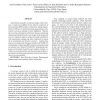Free Online Productivity Tools
i2Speak
i2Symbol
i2OCR
iTex2Img
iWeb2Print
iWeb2Shot
i2Type
iPdf2Split
iPdf2Merge
i2Bopomofo
i2Arabic
i2Style
i2Image
i2PDF
iLatex2Rtf
Sci2ools
COMPSAC
2002
IEEE
2002
IEEE
Formalizing Incremental Design in Real-time Area: SCTL/MUS-T
Achievement of quality in software design, while never easy, is made more difficult by the inherent complexity of hard real-time (HRT) design. Furthermore, timing requirements in HRT are by nature functional requirements, since system correctness depends on their fulfillment. Whereas the correctness dependence of the time imposes considering timing requirements from the early stages of the production process, complexity enforces a lifecycle model which fits in with requirements change and splits complexity by means of an incremental and iterative structure. Taking these aims as a starting point, this paper introduces SCTL/MUS-T methodology as supporting HRT design in a formalized and incremental way. Despite SCTL/MUS-T methodology integrates several kinds of analysis and synthesis methods, we will focus on its formal basis and the main ideas behind requirements elicitation and automated construction of prototypes in an incrementally.
COMPSAC 2002 | Nature Functional Requirements | SCTL/MUS-T Methodology | Software Engineering | Timing Requirements |
Related Content
| Added | 14 Jul 2010 |
| Updated | 14 Jul 2010 |
| Type | Conference |
| Year | 2002 |
| Where | COMPSAC |
| Authors | Ana Fernández Vilas, José J. Pazos Arias, Rebeca P. Díaz Redondo, Ana Belén Barragáns-Martínez |
Comments (0)

